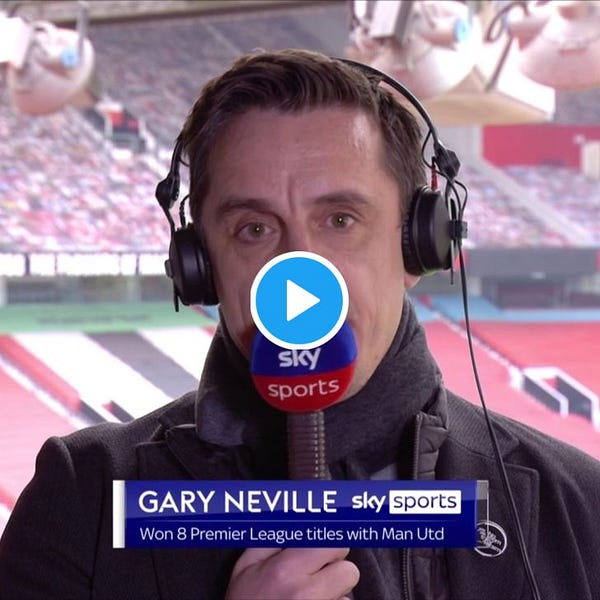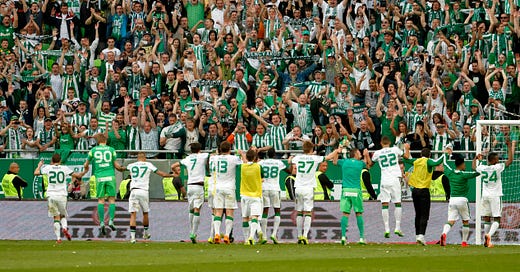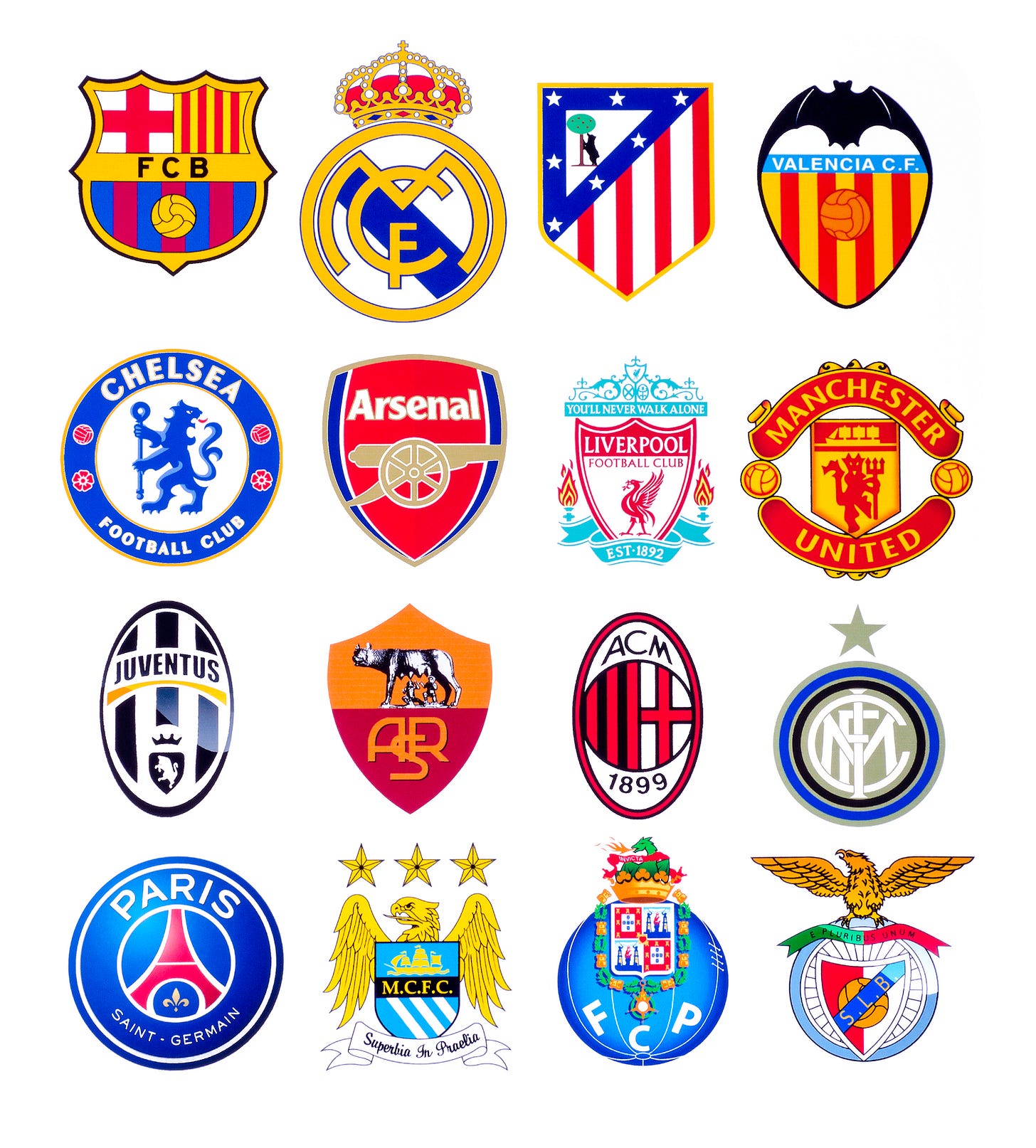How the European "Super League" Revolt Reflects Our Times
From the GameStop phenomenon to European football's failed "Super League" to an award-winning Arab novel, reflections on our Age of Anxiety and Revolt
I was recently re-reading the extraordinary Booker Prize-winning Omani novel, Celestial Bodies by Jokha Alharthi, and it made me think of the failed European football “Super League,” the GameStop stock phenomenon, rising populism of the left and right and our current Age of Anxiety and Revolt.
I know: that’s a lot to think about from a multi-character novel that depicts the inner and intersecting lives of three sisters, several families and servants grappling with modernity and tradition in mid-to-late twentieth century Oman. There was a moment toward the end of the book that left me breathless. So I went back to the passage recently to think about its larger meaning, and somehow I kept coming back to these recent events.
The episode centered around Khawla, a long-suffering wife of a man, Nasir, who treated her terribly for about a decade. He displayed no love for her, would leave her alone to give birth while he visited his mistress in Canada and often left her short of money. Over the years, Khawla quietly endured this cruel treatment and saw “her bed cold, her beauty wrecked, the neighbours taking her children to the hospital if they fell ill, her sisters loaning her money when she needed it, her mother scolding her, and her neighbors’ eyes full of pity.”
Then, suddenly, as if nothing had ever happened, Nasir shifted tack, closed the chapter on his Canada life and mistress, and became a faithful husband and provider. For the next ten years, he worked hard, stayed home, no longer traveled and their life seemed outwardly normal: a model of family bliss, with healthy children, the youngest in high school, a daughter about to marry a respectable engineer. The tide had turned.
Amid this public respectability - even tranquility -- Khawla suddenly had a revelation: the past was too much to bear. She wanted a divorce. Her life was at peace now, “so her heart stopped forgiving. She couldn’t bear the past any longer. All of it seemed now to have grown to an enormous size inside her, and it choked her. Every night, the portrait of the Canadian girl on the keyring got bigger...Every day, all of those hours she had spent alone in maternity wards marched out in force to pounce on her.”
All she wanted from her husband in those early years was recognition, a touch of love, anything. Al-Harthi writes: “Even an angry scolding! A sigh of exasperation. A cheap gift. Anything would have been a lot, But that anything never came...And, now, everything is not enough..How could [Nasir] understand that the seed planted in those first ten years had suddenly erupted in her body, growing thorns that tore her into shreds?”
It was a powerful image: seeds planted that grow into thorns and tear her body to shreds. All through history, we have seen seeds planted in societies, polities, international relations that ultimately grow into thorns and tear bodies to shreds: the Versailles Treaty, Germany’s post World War I humiliation and hyper-inflation that helped grow the thorn of Hitler and Nazism that tore Europe to shreds. Or perhaps years of bad governance, mismanagement, corruption, and predatory policies in several Arab countries that planted the seeds that grew into thorns (or roses with thorns?) that sparked the Arab Uprisings. One could go on and on.
The point is that our world may have some seeds that are growing into thorns right now. Let’s consider the GameStop stock phenomenon. By now, we know the broad contours of the story: starting in late January, a group of day traders and every day Joe’s (not many Josephine’s, this was largely a young male phenomenon) decided to take on Wall Street by buying up shares in GameStop, a struggling video game retailer. Their aim: to squeeze hedge funds like Melvin Capital that were shorting the stock.
Melvin Capital came to symbolize everything that was wrong with “the system,” one in which - in their eyes -- Wall Street insiders get bailed out by the government, rise ever higher into the 1%, and rig the game for their own ilk. Never mind the fact that hedge funds never got bailed out (big Wall Street banks and insurers did), and never mind that this simple tale of Everyman vs “The Man” was not the whole story, and there were plenty of sophisticated former finance guys in their million dollar homes playing populist to ride the GameStop stock to new highs.
Still, there were also plenty of young men in dead end jobs or struggling to get by who rode this populist investing wave in search of two M’s: money and meaning. For many, the latter seemed even more important. Spend some time on the WallStreetBets site on Reddit and once you filter out the sophomoric humor and the locker room lingo, you’ll see a group of young men looking to belong, searching for meaning, finding camaraderie in this online group of rebels in their basements, and looking for a measure of revenge against the big shots who, in their eyes, call the shots.
At a time of heightened anxiety and increased loneliness, many seemed to see the GameStop ride as a cathartic moment, one that was far more than a stock trade. There were also some thorns in some stomachs. Many refer to the 2008-9 financial crisis as the origin of their anger against Wall Street. One post by someone who goes by the moniker “ssauronn” two months ago captured this mood. “ssauronn” writes:
“I was in my early teens during the '08 crisis. I vividly remember the enormous repercussions that the reckless actions by those on Wall Street had in my personal life, and the lives of those close to me...My aunt moved in with us and paid what little rent she could to my family while she tried to find any sort of work. Do you know what tomato soup made out of school cafeteria ketchup packets taste like?”
“To Melvin Capital: you stand for everything that I hated during that time. You're a firm who makes money off of exploiting a company and manipulating markets and media to your advantage. Your continued existence is a sharp reminder that the ones in charge of so much hardship during the '08 crisis were not punished.”
“To CNBC: you must realize your short term gains through promoting institutions' agenda is just that - short term. Your staple audience will soon become too old to care, and the millions of us, not just at WSB (WallStreetBets) but every person affected by the '08 crash that's now paying attention to GME (GameStop), are going to remember how you stuck up for the firms that ruined so many of us, and tried to tear down the little guys”
“Whether you're here for the gains, to stick it to the man as I am, or just to be part of a potentially market changing movement - thank you. Each and every one of you are the reason that we have this chance. I've never felt this optimistic about the future before. This is life changing amounts of money for so many of you, and to be part of a rare instance of a wealth distribution from the rich to the poor is just incredible. I love you all.”
Clearly, some seeds grew in the stomach of ssauronn and so many others after the 2008-9 financial crisis and we are witnessing those flowers nows, thorns and all. Similar thorns likely drove Brexit and Donald Trump, and even the populist movement led by Bernie Sanders, and populists of the left and right in Europe. The populism of the left and the right have something in common: they mistrust “elites” and believe that established forces and institutions continue to hold them back - not an entirely inaccurate stance.
This broad sense that “the establishment” doesn’t care about the everyday person was highlighted in the world of sports recently. The elites and the 1% of European football went too far last week when several teams announced a European Super League that would encompass twelve of the richest teams playing for rich prizes in a gated community of “the beautiful game.” They could thus bypass the poorer teams in the European Champions League, and simply go head-to-head with their peers. It smacked of oligarchy, cartels, and insider trading.
It was as if Roget Federer, Rafael Nadal, Novak Djokovic, Andy Murray and eight other top seeds decided to create their own Grand Slam system. Damn those pesky first round match-ups at Wimbledon or Roland Garros in Paris. We’ll just play each other.
Predictably, a revolt gathered steam. Fans gathered outside stadiums, carrying signs that read “Super Greed." Sports commentators were aghast. An epic j’accuse takedown of the idea by former Manchester United player Gary Neville went viral (see below). An insurrection was brewing.
European teams — especially the top tier — had already become bastions of globalized capitalism with teams buying up the best players at eye-popping prices and multi-million dollar TV and endorsement deals becoming routine. For me, as someone who grew up watching American sports (where the corporate sponsors remained largely off the field and in the TV commercials), it’s still a little jarring to see a corporate logo emblazoned on a team jersey - routine in European football
I explored this theme in a 2017 Washington Post article. A an excerpt below:
"When A.C. Milan took to the field against Inter Milan last November (2016), the clash represented one of the great rivalries in all of European soccer, a battle between two of of Italy’s most storied soccer franchises, both with histories dating back more than a century.”
“The match also represented something else: a case study in the globalization of European soccer, with a decidedly Chinese flavor. Both teams were acquired in 2016 by Chinese investors for a total exceeding $1 billion, a capstone to a flurry of Chinese purchases of European soccer clubs over the past two years.”
“Welcome to the world of globalized European soccer, a multibillion-dollar industry that attracts investors from Bangkok to Beijing, from the United Arab Emirates to the United States. Soccer — or football, as it is known around the world — remains the world’s most popular sport by far, and there are no brighter lights in the global soccer firmament than the European leagues and stars.”
European football remained wildly popular, so the “geniuses” who came up with the idea of the European Super League - largely driven by Real Madrid and Juventus, according to a great blow-by-blow of the story by the New York Times — clearly had a tin ear for our times. Amid a pandemic that has exacerbated inequality worldwide and in a time of rising populism, they decided to create an unequal playing field of elite squads, to be financed by — drumroll please — J.P Morgan.
To use a baseball term, they threw a soft pitch down the middle, and politicians were stepping all over each other to get to the plate and hit a home run. British Prime Minister Boris Johnson rolled up his sleeves and took aim as did French President Emmanuel Macron. It was an easy moment to play populist. Even Prince William tweeted his concern.
When Manchester City, one of the reluctant and last-minute entries, pulled out, the house of cards came tumbling down. To their credit, the team owners who initiated the deal did not dig in. They folded. Bad idea, they said. Mea culpa. Nothing to see here. Let’s move on.
But the attempt will still sting. As a Liverpool fan myself, I always liked the “you’ll never walk alone” theme. Should we have expected more from Liverpool, a globalized sports behemoth? It’s worth remembering the lyrics to Liverpool’s anthem, even if they did not live up to its spirit with this attempted move.
When you walk through a storm, hold your head up high
And don’t be afraid of the dark
At the end of the storm, there’s a golden sky
And the sweet, silver song of a lark
Walk on through the wind
Walk on through the rain
Though your dreams be tossed and blown
Walk on, walk on
With hope in your heart
And you’ll never walk alone
You’ll never walk alone
Walk on, walk on
With hope in your heart
And you’ll never walk alone
You’ll never walk alone
In our world today, hope in hearts seems to be on the wane. What seeds are growing from the Covid-19 pandemic, a time when people are losing jobs and livelihoods, kids are not in school, and depression, anxiety, and loneliness are at highs. Will we see the thorns of Covid-19 now, or a decade from now?
For Khawla, in Alharthi’s novel, “The past came back every day, a warrior’s lance that stabbed her through.”
When we find some solutions to some of our critical problems, will it be too late? Or will those thorns growing today become so large that they rip across our world?
************************************************************************************************************
As a fellow traveler in our Emerging World caravan, you will certainly never walk alone. I would love to hear from you on LinkedIn or on eworldairmail@gmail.com or in the Comments section. And if you’d like to join our caravan of seekers and fellow travelers trying to understand where our world is headed…
See below Gary Neville’s epic rant against the Super League (don’t click on the play button, click on the tweet itself)


For one of the best renditions of You’ll Never Walk Alone, see the incomparable Andrea Bocelli below (double click):
As usual, we will publish a daily round-up of top emerging markets stories (except Saturday) from the global media, occasional thought leaders interviews, this weekly column from your humble correspondent and fellow traveler, and a round-up of what we’re reading, watching, seeing and hearing from white papers to vintage posters to films and serials. So, please send your recommendations to eworldairmail@gmail.com or get in touch another way.
Have a great weekend and week ahead.
Afshin
“Be happy for this moment. This moment is your life.” Omar Khayyam





